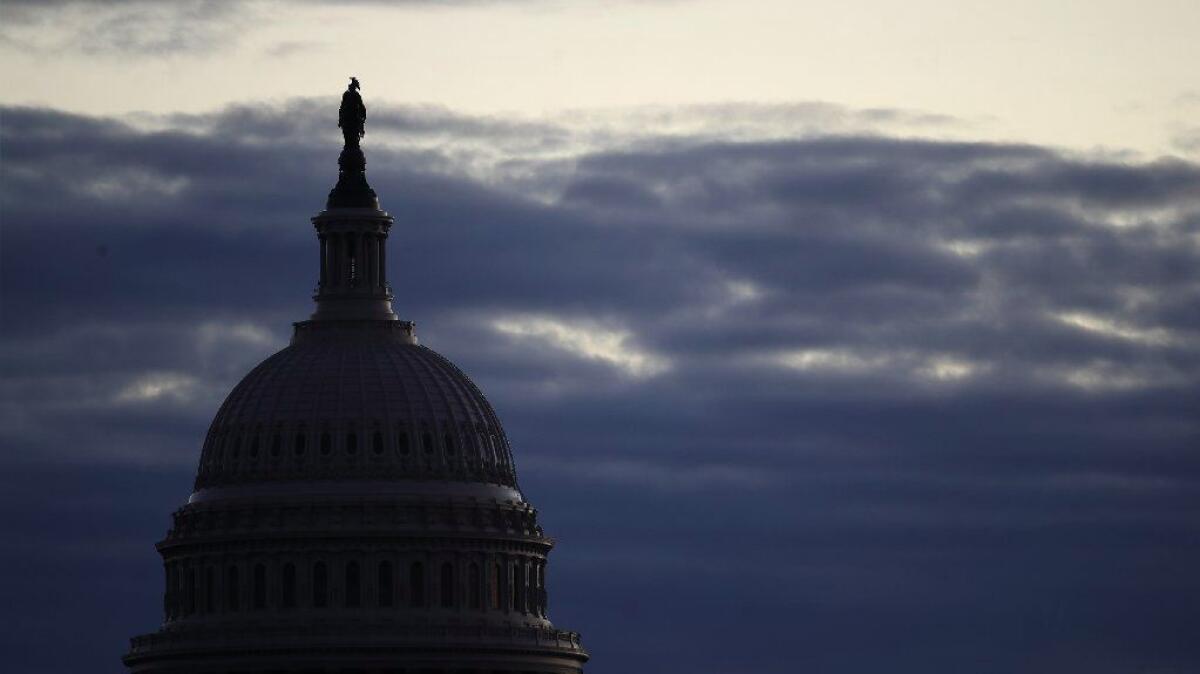Five days in, no end in sight for partial government shutdown

- Share via
Reporting from Washington — Five days after about one-fourth of the federal government was shut down in a funding dispute, affecting about 800,000 federal workers, no solution appeared in sight Wednesday.
President Trump made an unannounced visit to a U.S. airbase in Iraq after days of raging at Democrats for not agreeing to his demand for $5 billion as a down payment for his long-promised border wall. Democrats and Republicans had initially agreed on $1.6 billion for border security.
Asked on the trip how long will the shutdown will last, Trump said, “Whatever it takes. We need a wall. We need safety for our country.”
Without a deal on border funding, the shutdown began Saturday and the acting White House chief of staff, Mick Mulvaney, warned over the weekend that the impasse could last into the new year.
Aides to Democratic leaders of the House and Senate said Wednesday they had no updates on negotiations.
Capitol Hill was quiet, with many members of Congress in their districts or traveling abroad over the holidays. Newspapers piled up outside of congressional leaders’ locked offices and the children of a few staff members roamed the marble halls alongside a smattering of tourists.
The Senate is set to return Thursday, and the House will briefly meet then. But no votes are scheduled and members were promised 24 hours’ notice so they have time to return and vote.
Trump’s chances of getting the $5 billion drop dramatically if a resolution isn’t reached in the next few days. Democrats will take over the House on Jan. 3 when the new Congress begins and their leverage is only likely to grow. They have little reason to concede or compromise with the president on one of his top campaign promises.
Most Americans probably didn’t notice the shutdown over the long Christmas weekend. That could change Wednesday when federal offices were due to reopen — or in some cases stay closed.
The partial shutdown includes the departments of Homeland Security, State, Agriculture, Commerce, Housing and Urban Development, Interior, Justice and Transportation, as well as NASA, the Food and Drug Administration and the Environmental Protection Agency.
About 800,000 federal employees won’t be paid until the government reopens, although about 420,000 are considered essential and were expected to work without pay, while the rest were sent home. In previous shutdowns, the affected workers received back pay even if they were temporarily furloughed.
Federal employees and their families are using the hashtag #shutdownstories on Twitter to detail mortgage and rent payments they expect to miss because of the delay. For some, the first missed pay day is on Friday.
In addition to thousands of Border Patrol agents, about 44,000 active duty members of the Coast Guard are working without pay. They are the only branch of the military funded by Homeland Security.
Under the shutdown, the Federal Housing Administration and the Small Business Administration will be unable to process new home or small business loans; the State Department may stop issuing or renewing passports and visas; and on the cusp of tax season the IRS will stop issuing tax refunds.
Many of the country’s most popular national parks will remain open, but with minimal staffing or maintenance of facilities including bathrooms. In some cases, states are paying to keep parks and monuments open. Lesser known parks have been shuttered.
The Agriculture Department announced that eligible families will receive Supplemental Nutrition Assistance Program benefits in January, but food assistance programs for the elderly, people on Indian reservations and the Women, Infants and Children assistance program will be available only until existing resources run out.
It said it will not be able to provide new farm loans, often needed to help finance spring planting, if the shutdown continues for longer than a week.
Training for new employees at the affected departments is on hold, including for emergency responders who help during disasters, Foreign Service officers and airport security screeners.
Congress passed laws to fund about 75% of government agencies before the fiscal year ended in September so much of government remains open.
More stories from Sarah D. Wire »
Twitter: @sarahdwire
More to Read
Get the L.A. Times Politics newsletter
Deeply reported insights into legislation, politics and policy from Sacramento, Washington and beyond. In your inbox three times per week.
You may occasionally receive promotional content from the Los Angeles Times.











